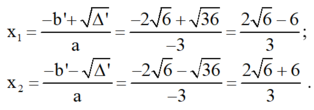giải phương trình:
a,
b,
giải hệ phương trình:
a, \(4x^2-14x+12=0\)
b, \(3t^2-15t+5=0\)
Bài 1 giải phương trình:
a) (4x2+4x+1)-x2=0
b) x2-2x+1=4
c) x2-5x+6=0
Bài 2: giải phương trình
a) \(\dfrac{2x-5}{x+5}\)= 3
b) \(\dfrac{5}{3x+2}\)= 2x-1
c) \(\dfrac{x^2-6}{x}\)= x+\(\dfrac{3}{2}\)
d) \(\dfrac{1}{x-2}\)+3= \(\dfrac{x-3}{2-x}\)
e) \(\dfrac{3x-2}{x+7}\)=\(\dfrac{6x+1}{2x-3}\)
f) \(\dfrac{x-2}{x+2}\) - \(\dfrac{3}{x-2}\)=\(\dfrac{2\left(x-11\right)}{x^2-4}\)
Bài 1:
a.
$(4x^2+4x+1)-x^2=0$
$\Leftrightarrow (2x+1)^2-x^2=0$
$\Leftrightarrow (2x+1-x)(2x+1+x)=0$
$\Leftrightarrow (x+1)(3x+1)=0$
$\Rightarrow x+1=0$ hoặc $3x+1=0$
$\Rightarrow x=-1$ hoặc $x=-\frac{1}{3}$
b.
$x^2-2x+1=4$
$\Leftrightarrow (x-1)^2=2^2$
$\Leftrightarrow (x-1)^2-2^2=0$
$\Leftrightarrow (x-1-2)(x-1+2)=0$
$\Leftrightarrow (x-3)(x+1)=0$
$\Leftrightarrow x-3=0$ hoặc $x+1=0$
$\Leftrightarrow x=3$ hoặc $x=-1$
c.
$x^2-5x+6=0$
$\Leftrightarrow (x^2-2x)-(3x-6)=0$
$\Leftrightarrow x(x-2)-3(x-2)=0$
$\Leftrightarrow (x-2)(x-3)=0$
$\Leftrightarrow x-2=0$ hoặc $x-3=0$
$\Leftrightarrow x=2$ hoặc $x=3$
2c.
ĐKXĐ: $x\neq 0$
PT $\Leftrightarrow x-\frac{6}{x}=x+\frac{3}{2}$
$\Leftrightarrow -\frac{6}{x}=\frac{3}{2}$
$\Leftrightarrow x=-4$ (tm)
2d.
ĐKXĐ: $x\neq 2$
PT $\Leftrightarrow \frac{1+3(x-2)}{x-2}=\frac{3-x}{x-2}$
$\Leftrightarrow \frac{3x-5}{x-2}=\frac{3-x}{x-2}$
$\Rightarrow 3x-5=3-x$
$\Leftrightarrow 4x=8$
$\Leftrightarrow x=2$ (không tm)
Vậy pt vô nghiệm.
2f.
ĐKXĐ: $x\neq \pm 2$
PT $\Leftrightarrow \frac{(x-2)^2-3(x+2)}{(x+2)(x-2)}=\frac{2(x-11)}{(x-2)(x+2)}$
$\Rightarrow (x-2)^2-3(x+2)=2(x-11)$
$\Leftrightarrow x^2-4x+4-3x-6=2x-22$
$\Leftrightarrow x^2-7x-2=2x-22$
$\Leftrightarrow x^2-9x+20=0$
$\Leftrightarrow (x-4)(x-5)=0$
$\Leftrightarrow x-4=0$ hoặc $x-5=0$
$\Leftrightarrow x=4$ hoặc $x=5$ (tm)
Giải bất phương trình:
a) -2x+5 ≥ 0
b) (x-1)(x+3) > 0
a, \(-2x\ge-5\Leftrightarrow x\le\dfrac{5}{2}\)
b, TH1 : \(\left\{{}\begin{matrix}x-1>0\\x+3>0\end{matrix}\right.\Leftrightarrow\left\{{}\begin{matrix}x>1\\x>-3\end{matrix}\right.\Leftrightarrow x>1\)
TH2 : \(\left\{{}\begin{matrix}x-1< 0\\x+3< 0\end{matrix}\right.\Leftrightarrow\left\{{}\begin{matrix}x< 1\\x< -3\end{matrix}\right.\Leftrightarrow x< -3\)
Bài 5: Giải các phương trình sau:
a. (3x - 1)2 - (x + 3)2 = 0
b. x3 = \(\dfrac{x}{49}\)
c. x2 - 7x + 12 = 0
d. 4x2 - 3x -1 = 0
e. x3 - 2x - 4 = 0
f. x3 + 8x2 + 17x +10 = 0
g. x3 + 3x2 + 6x + 4 = 0
h. x3 - 11x2 + 30x = 0
a. (3x - 1)2 - (x + 3)2 = 0
\(\Leftrightarrow\left(3x-1+x+3\right)\left(3x-1-x-3\right)=0\)
\(\Leftrightarrow\left(4x+2\right)\left(2x-4\right)=0\)
\(\Leftrightarrow4x+2=0\) hoặc \(2x-4=0\)
1. \(4x+2=0\Leftrightarrow4x=-2\Leftrightarrow x=-\dfrac{1}{2}\)
2. \(2x-4=0\Leftrightarrow2x=4\Leftrightarrow x=2\)
S=\(\left\{-\dfrac{1}{2};2\right\}\)
b. \(x^3=\dfrac{x}{49}\)
\(\Leftrightarrow49x^3=x\)
\(\Leftrightarrow49x^3-x=0\)
\(\Leftrightarrow x\left(49x^2-1\right)=0\)
\(\Leftrightarrow x\left(7x+1\right)\left(7x-1\right)=0\)
\(\Leftrightarrow x=0\) hoặc \(7x+1=0\) hoặc \(7x-1=0\)
1. x=0
2. \(7x+1=0\Leftrightarrow7x=-1\Leftrightarrow x=-\dfrac{1}{7}\)
3. \(7x-1=0\Leftrightarrow7x=1\Leftrightarrow x=\dfrac{1}{7}\)
*Cách khác:
a) Ta có: \(\left(3x-1\right)^2-\left(x+3\right)^2=0\)
\(\Leftrightarrow\left(3x-1\right)^2=\left(x+3\right)^2\)
\(\Leftrightarrow\left[{}\begin{matrix}3x-1=-x-3\\3x-1=x+3\end{matrix}\right.\Leftrightarrow\left[{}\begin{matrix}4x=-2\\2x=4\end{matrix}\right.\Leftrightarrow\left[{}\begin{matrix}x=-\dfrac{1}{2}\\x=2\end{matrix}\right.\)
Vậy: \(S=\left\{-\dfrac{1}{2};2\right\}\)
Xác định a, b', c rồi dùng công thức nghiệm thu gọn giải các phương trình:
a ) 4 x 2 + 4 x + 1 = 0 b ) 13852 x 2 − 14 x + 1 = 0 c ) 5 x 2 − 6 x + 1 = 0 d ) − 3 x 2 + 4 6 ⋅ x + 4 = 0
a) Phương trình bậc hai 4 x 2 + 4 x + 1 = 0
Có a = 4; b’ = 2; c = 1; Δ ’ = ( b ’ ) 2 – a c = 2 2 – 4 . 1 = 0
Phương trình có nghiệm kép là:

b) Phương trình 13852 x 2 – 14 x + 1 = 0
Có a = 13852; b’ = -7; c = 1;
Δ ’ = ( b ’ ) 2 – a c = ( - 7 ) 2 – 13852 . 1 = - 13803 < 0
Vậy phương trình vô nghiệm.
c) Phương trình bậc hai 5 x 2 – 6 x + 1 = 0
Có: a = 5; b’ = -3; c = 1.; Δ ’ = ( b ’ ) 2 – a c = ( - 3 ) 2 – 5 . 1 = 4 > 0
Phương trình có hai nghiệm phân biệt:

d) Phương trình bậc hai: ![]()

Phương trình có hai nghiệm phân biệt :

Kiến thức áp dụng
Phương trình ax2 + bx + c = 0 (a ≠ 0) có biệt thức Δ = b2 – 4ac.
+ Nếu Δ > 0, phương trình có hai nghiệm phân biệt 
+ Nếu Δ = 0, phương trình có nghiệm kép  ;
;
+ Nếu Δ < 0, phương trình vô nghiệm.
Giúp vs ạ
Bài 1 giải các bất phương trình sau
a.x2 - x - 6 = 0
b.2x2 - 7x + 5 < 0
c.3x2 - 9x + 6 ≥ 0
d.2x2 - 5x + 3 < 0
Bài 2 Giải phương trình sau
A.√x2 + x + 5 = √2x2 - 4x + 1
B.√11x2 -14x - 12 = √3x2 + 4x - 7
Bài 2:
a: =>2x^2-4x+1=x^2+x+5
=>x^2-5x-4=0
=>\(x=\dfrac{5\pm\sqrt{41}}{2}\)
b: =>11x^2-14x-12=3x^2+4x-7
=>8x^2-18x-5=0
=>x=5/2 hoặc x=-1/4
Giải các phương trình:
a) (x - 7)(2x + 8) = 0
b) (3x +1)(5x - 2) = 0
c) (x - 1)(2x + 7)(x2 + 2) = 0
d) (2x - 1)(x + 8)(x - 5) = 0
a) (x - 7)(2x + 8) = 0
\(\Leftrightarrow\left[{}\begin{matrix}x-7=0\\2x+8=0\end{matrix}\right.\)
\(\Leftrightarrow\left[{}\begin{matrix}x=7\\2x=-8\end{matrix}\right.\)
\(\Leftrightarrow\left[{}\begin{matrix}x=7\\x=-4\end{matrix}\right.\)
Vậy: S = {7; -4}
b) Tương tự câu a
c) (x - 1)(2x + 7)(x2 + 2) = 0
\(\Leftrightarrow\left[{}\begin{matrix}x-1=0\\2x+7=0\\x^2+2=0\end{matrix}\right.\)
Mà: x2 + 2 > 0 với mọi x
\(\Leftrightarrow\left[{}\begin{matrix}x-1=0\\2x+7=0\end{matrix}\right.\)
\(\Leftrightarrow\left[{}\begin{matrix}x=1\\2x=-7\end{matrix}\right.\)
\(\Leftrightarrow\left[{}\begin{matrix}x=1\\x=-\dfrac{7}{2}\end{matrix}\right.\)
Vậy: \(S=\left\{1;-\dfrac{7}{2}\right\}\)
d) (2x - 1)(x + 8)(x - 5) = 0
\(\Leftrightarrow\left[{}\begin{matrix}2x-1=0\\x+8=0\\x-5=0\end{matrix}\right.\)
\(\Leftrightarrow\left[{}\begin{matrix}2x=1\\x=-8\\x=5\end{matrix}\right.\)
\(\Leftrightarrow\left[{}\begin{matrix}x=\dfrac{1}{2}\\x=-8\\x=5\end{matrix}\right.\)
Vậy \(S=\left\{\dfrac{1}{2};-8;5\right\}\)
a/ Pt \(\Leftrightarrow\left[{}\begin{matrix}x-7=0\\2x+8=0\end{matrix}\right.\) \(\Leftrightarrow\left[{}\begin{matrix}x=7\\x=-4\end{matrix}\right.\)
Vậy \(S=\left\{7;-4\right\}\)
b/ pt \(\Leftrightarrow\left[{}\begin{matrix}3x+1=0\\5x-2=0\end{matrix}\right.\) \(\Leftrightarrow\left[{}\begin{matrix}x=-\dfrac{1}{3}\\x=\dfrac{2}{5}\end{matrix}\right.\)
c/ pt \(\Leftrightarrow\left[{}\begin{matrix}x-1=0\\2x+7=0\end{matrix}\right.\) (\(x^2+2>0\forall x\))\(\Leftrightarrow\left[{}\begin{matrix}x=1\\x=-\dfrac{7}{2}\end{matrix}\right.\)
d/ pt \(\Leftrightarrow\left[{}\begin{matrix}2x-1=0\\x+8=0\\x-5=0\end{matrix}\right.\)\(\Leftrightarrow\left[{}\begin{matrix}x=\dfrac{1}{2}\\x=-8\\x=5\end{matrix}\right.\)
a)(x-7)(2x+8)=0
⇔x-7=0 hoặc 2x+8=0
1.x-7=0⇔x=7
2.2x+8=0⇔2x=-8⇔x=-4
phương trình có 1 nghiệm x=7 và x=-4
b)(3x+1)(5x-2)=0
⇔3x+1=0 hoặc 5x-2=0
1.3x+1=0⇔3x=-1⇔x=-1/3
2.5x-2=0⇔5x=2⇔x=5/2
phương trình có 2 nghiệm x=-1/3 và x=5/2
Giải phương trình và bất phương trình:
a) \(\sqrt{4x-12}-\sqrt{9x-27}+\sqrt{\dfrac{25x-75}{4}-3=0}\)
b) \(\dfrac{\sqrt{x}-2}{\sqrt{x}+1}\) ≤ \(\dfrac{-3}{4}\)
c) \(\sqrt{9x-45}-14\sqrt{\dfrac{x-5}{49}}+\dfrac{1}{4}\sqrt{4x-20}=3\)
a: ĐKXĐ: x>=3
Sửa đề: \(\sqrt{4x-12}-\sqrt{9x-27}+\sqrt{\dfrac{25x-75}{4}}-3=0\)
=>\(2\sqrt{x-3}-3\sqrt{x-3}+\dfrac{5}{2}\sqrt{x-3}-3=0\)
=>\(\dfrac{3}{2}\sqrt{x-3}=3\)
=>\(\sqrt{x-3}=2\)
=>x-3=4
=>x=7(nhận)
b: ĐKXĐ: x>=0
\(\dfrac{\sqrt{x}-2}{\sqrt{x}+1}< =-\dfrac{3}{4}\)
=>\(\dfrac{\sqrt{x}-2}{\sqrt{x}+1}+\dfrac{3}{4}< =0\)
=>\(\dfrac{4\sqrt{x}-8+3\sqrt{x}+3}{4\left(\sqrt{x}+1\right)}< =0\)
=>\(7\sqrt{x}-5< =0\)
=>\(\sqrt{x}< =\dfrac{5}{7}\)
=>0<=x<=25/49
c: ĐKXĐ: x>=5
\(\sqrt{9x-45}-14\sqrt{\dfrac{x-5}{49}}+\dfrac{1}{4}\sqrt{4x-20}=3\)
=>\(3\sqrt{x-5}-14\cdot\dfrac{\sqrt{x-5}}{7}+\dfrac{1}{4}\cdot2\cdot\sqrt{x-5}=3\)
=>\(\dfrac{3}{2}\sqrt{x-5}=3\)
=>\(\sqrt{x-5}=2\)
=>x-5=4
=>x=9(nhận)
giải phương trình:
a, x4-x2-2=0
b, x4+2x3+x2=0
c,x3-1= 0
d, 6x2-7x+2=0
a, \(x^4-x^2-2=0\Leftrightarrow x^4-2x^2+x^2-2=0\)
\(\Leftrightarrow x^2\left(x^2-2\right)+\left(x^2-2\right)=0\Leftrightarrow\left(x^2+1>0\right)\left(x^2-2\right)=0\Leftrightarrow x=\pm\sqrt{2}\)
b, \(\Leftrightarrow x^2\left(x^2+2x+1\right)=0\Leftrightarrow x^2\left(x+1\right)^2=0\Leftrightarrow x=0;x=-1\)
c, \(\Leftrightarrow\left(x-1\right)\left(x^2+x+1>0\right)=0\Leftrightarrow x=1\)
d, \(\Leftrightarrow6x^2-3x-4x+2=0\Leftrightarrow\left(3x-2\right)\left(2x-1\right)=0\Leftrightarrow x=\dfrac{2}{3};x=\dfrac{1}{2}\)
a)
/ \(x^4+x^2-2=0\)
\(\Leftrightarrow\left(x^2\right)^2-x^2+2x^2-2=0\\ \Leftrightarrow x^2\left(x^2-1\right)+2\left(x^2-1\right)=0\\ \Leftrightarrow\left(x^2+2\right)\left(x^2-1\right)=0\\ \Leftrightarrow\left(x^2+2\right)\left(x-1\right)\left(x+1\right)=0\\ \Leftrightarrow\left[{}\begin{matrix}x^2+2=0\\x+1=0\\x-1-0\end{matrix}\right.\Leftrightarrow\left[{}\begin{matrix}x=1\\x=-1\end{matrix}\right.\)